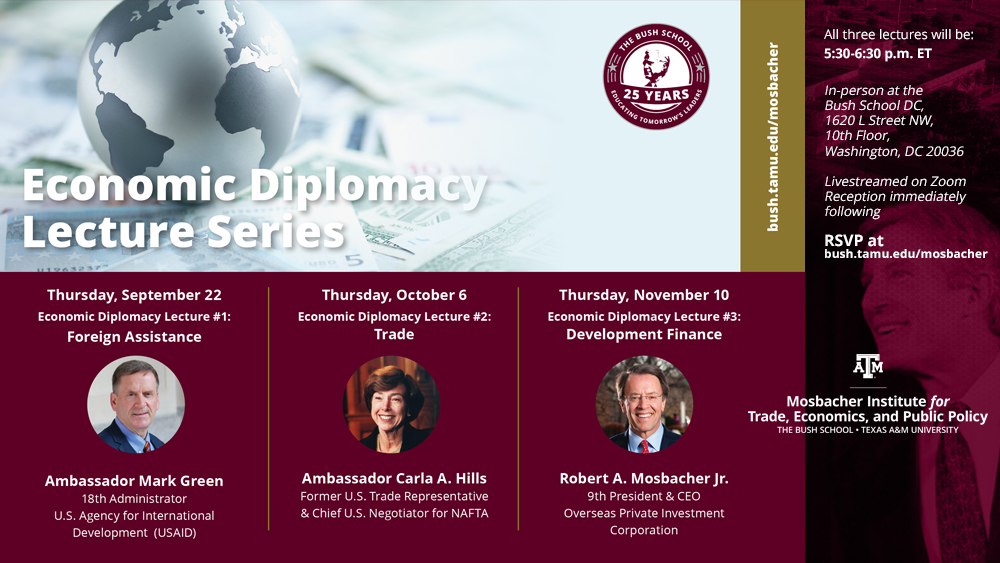
The Bush School of Government & Public Service will host a 3-part lecture series on economic diplomacy tools that are critical for advancing U.S. foreign policy goals.
The Mosbacher Institute at the Bush School of Government and Public Service will host a fall lecture series to highlight tools of U.S. economic diplomacy that are key to advancing the strategic and security interests of the United States. China’s very aggressive and expansive strategy to gain influence throughout the developing world by financing critical infrastructure projects in developing countries is proof that global power is not just determined by diplomatic or military might, but also by the capacity to enable and support economic development and growth. The advancement of a free-market rule-of-law model is critical to countering China’s authoritarian capitalist approach.
Please register online to attend in person or via Zoom
This three-part series is designed for those interested in developing a practical understanding of the various economic levers used to support U.S. goals at home and abroad, including foreign assistance, trade, and development finance. The lectures, scheduled for September 22, October 6, and November 10, will all be held from 5:30–6:30 p.m. Eastern Time at the Bush School DC, located at 1620 L Street NW in Washington, DC, and also livestreamed on Zoom. To participate, either in-person or via livestream, please sign up at bush.tamu.edu/mosbacher.
The September 22 lecture will feature Ambassador Mark Green, 18th Administrator of the U.S. Agency for International Development (USAID), speaking about the role of foreign assistance. At USAID, Green led the agency’s international humanitarian efforts to save lives, improve economic prosperity, strengthen democratic governance, and advance U.S. national security. He now serves as the president, director, and CEO of the Woodrow Wilson International Center for Scholars.
On October 6, Ambassador Carla Hills, U.S. Trade Representative from 1989 to 1993, will speak about the importance of trade to improving economic opportunities and diplomatic relations. As a member of President George H.W. Bush’s Cabinet, Hills was the nation’s chief trade negotiator, representing American interests in multilateral and bilateral trade negotiations throughout the world. Hills negotiated and concluded the North American Free Trade Agreement and also led the U.S. negotiations on the Uruguay Round of the World Trade Organization.
At the concluding lecture on November 10, Robert Mosbacher Jr., the 9th president & CEO of the Overseas Private Investment Corporation and current chair of the Development Advisory Council of the U.S. International Development Finance Corporation (DFC), will speak about development finance. DFC partners with the private sector to finance solutions to consequential challenges in the developing world, such as energy and infrastructure deficiencies.
The Mosbacher Institute at the Bush School of Government and Public Service is a nonpartisan organization dedicated to addressing the most pressing challenges confronting the United States and world economies by conducting policy-relevant research; providing education; and engaging stakeholders in the areas of trade, economics, and public policy.

